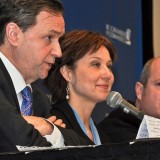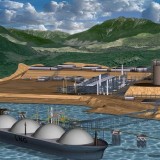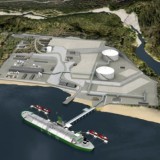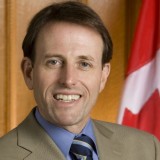Alberta Premier Alison Redford recently took the unprecedented step of holding a “State of the Province” Address. This hauntingly American-style public relations stunt came about as a result of the longstanding work of behind-the-scenes chief architect of Canada as an Energy Superpower, David Emerson.
Here at the Common Sense Canadian we have tracked in some detail the efforts of former Harper Government Trade Minister David Emerson and his role as Chair of the Energy Policy Institute of Canada (EPIC). We have noted that while Mr. Emerson garners little coverage in mainstream media, his fingerprints can be found on every aspect of Canada’s evolution into a petro state. The corporate-driven policy “think tank” EPIC is the instrument of Emerson’s work.
This, we demonstrated, was evident when premiers took centre stage in Nova Scotia last summer to talk up Canada’s “National Energy Strategy”, while exploring “what was in it for every Canadian.” A central talking point dictated by Emerson and his EPIC communications shop in the exhaustive National Energy Strategy package he provided to all of the nation’s premiers, energy ministers and the PMO/PCO.
We underscored how this was just the tip of the iceberg in a longstanding trend where Emerson and EPIC drafted, promoted and delivered every recent development we have seen on the energy file. From the National Energy Strategy, through the raft of legislative changes we have seen since Harper came to power, including the paradigm shift in environmental policies dictating resource exploitation contained in the recent Omnibus Bills.
We undertook an exhaustive campaign, which grew exponentially in response to the secretive processes surrounding the establishment of the FIPA treaty, and we pointed to Emerson’s time in office as Minister of International Trade and Minister for the Pacific Gateway (before returning to the private sector in 2008 to work for the China Investment Corporation) where he claimed that establishing the Chinese FIPA was his “ultimate goal.” And we did our best to stop it.
Today we are going to explore Emerson’s role in what is being billed as a “once in a generation” restructuring of the Province of Alberta,establishing a New Normal, while the Province prepares to ratchet up Tar Sands production to meet the five-fold increase the Harper government and industry outlined as their shared goal early in the Conservative mandate.
For decades the Alberta Advantage defined that Province as the apparent envy of the nation. No Provincial sales tax, capital tax, payroll tax or health premiums was the “advantage” Albertan’s enjoyed as a result of their oil bounty. This was the foundation of a mountain of oily rhetoric that promoted self-reliance, hard work, small government, no taxes, cheap fuel and lots of toys – all of which defined “freedom” in the public psyche of Alberta.
Enter David Emerson.
Albertans have come to accept that oil wealth does not translate into cheap gasoline for their huge trucks. They have come to understand that small government means less service, but are proud to dig deep for the services they want, because they are “self-reliant”. They know first hand the environmental impact of a massive exploitation agenda and are aware of the “myth” of climate change. But, can they accept that much like death, provincial taxes are inevitable?
Can they accept that not even a massive escalation in oil production can balance budgets?
Massive escalation of Tar Sands production is the undercurrent that drives the entire Albertan frame of mind. You can feel it in the streets, at the coffee shops and on the “highway of death” that leads to the EPIC undertaking of the internationally-renowned Tar Sands, the largest industrial activity known to man.
It is therefore widely known that much of the Alberta advantage is oil-driven cultural myth, however the one thing no one can deny is there are no provincial taxes. This is evident in every purchase Albertans make, and apparently this daily reminder is enough to perpetuate the advantage myth and condition the average Albertan to accept foreign interests infiltrating their natural resource bounty, running off with the profits and leaving them to hold the environmental and fiscal bag.
Clearly the real Alberta Advantage falls in favour of foreign investment and almost entirely at the expense of average Albertans. Redford’s whole “State of the Province Address”, while predicated on myth, does forecast a 6 Billion dollar deficit in the March budget. Yes, thats right, oil rich Alberta, at a time when production rates have never been as high, is filing a SIX BILLION dollar shortfall in oil royalties.
So what does David Emerson have to do with all of this? We have established that Emerson and his shop are the architects of the real Alberta Advantage, steeped largely in favour of foreign interests – and now Albertans are experiencing first hand how he operates.
But what might come as a surprise to even Albertans is Emerson’s role in “reshaping” their future.
As appointed chair of the Alberta Premier’s Council for Economic Strategy (thanks to former premier Ed Stelmach who leaned hard on Emerson to get him through the battle over Royalties), Emerson has skillfully guided the policy fix – once again from the behind the scenes and on behalf of the largest most powerful companies on earth – and the Chinese Government.
His intention? The end of the Alberta “no taxes” advantage with a “broad based long term approach,” for which they have been priming the pump for years.
The reason? The corporate fabricated Bank-Backed Bitumen Bubble.
Former ICBC CEO and respected independent economist Robyn Allan skillfully analyzes this most current myth-making that EPIC puppet Premier Redford has put at the centre of her “once in a generation” restructuring. In a recent piece, Allan bursts the Bitumen Bubble the EPIC-affiliated propagandists have blown way out of proportion, which sets out Alberta’s “New Normal.”
Industry and government talking heads are singing from the Bitumen Bubble song sheet, and Allan rips it to shreds in her in-depth, rock-solid analysis, proving that much of the current fearmongering surrounding the finances of oil exports is indeed a bubble of hot air. “The narrative goes like this,” she writes. “Resistance to oil pipelines like Keystone XL, Northern Gateway and Trans Mountain’s twinning means an ever increasing supply glut in the U.S. Midwest, forcing the price of Western Canadian crude oil downwards as compared to the North American crude oil benchmark West Texas Intermediate — WTI.”
The implication is that oil sands operators would get more value if they could just access new markets via new supply routes. Allan demonstrates this is hogwash, built on some very fuzzy math and ignoring the fact that Alberta bitumen is a low-quality, expensive-to-process product which has and always will fetch bottom dollar compared with more favourable alternatives.
The bottom line of Allan’s analysis, is that we are being misled and that lack of access to new markets is not the real problem contributing to Alberta’s gargantuan debt, nor will access to new markets via BC fix it. Only reasonable, responsible royalty rates can balance Alberta’s budgets, protect and secure the Alberta Advantage and avoid a complete restructuring of the province.
Here is the hot air EPIC’s propagandists are using to restructure the Alberta Advantage. By blowing up the Bitumen Bubble and handing the advantages of oil to his corporate colleagues, Emerson’s fix is to dump the disadvantages onto average Albertans.
Instead of simply fixing budget shortfalls by establishing responsible royalty rates on massively escalating production rates, Albertans will be treated to a sleight of hand, by funnelling puny royalties into a new fund called “Shaping Alberta’s Future”. A two year-old Emerson recommendation now topped off with his shafting of Albertans by exploring the “expenditure side of the ledger.” I.e. deep cuts and reduced services. But the kicker, of course, the end of “no taxes.”
How does Emerson think he is going to strip Albertans of the last modicum of the Alberta Advantage that has long been the pride of Alberta? Can his propagandists shift the public psyche and alter the longstanding reality Albertans have clung to as their one distinguishing factor?
Here is Emerson in his own words:
The culture of Alberta has been built around low or no taxes for many decades. It’s not going to be an overnight psychological shift for the people of the province. My own view is you have to start first on the expenditure side and be fairly broad-based and multi-year in your approach.
In other words, start by cutting services, then phase in taxes over several years so people don’t get quite so hopping mad.
Redford parrots Emerson’s view. “It’s about this being a new reality and us having to face that,” she said in a recent interview.
In a conference call Monday with more than 5,000 members of her Conservative Party, Redford confirmed the province will borrow to pay for new infrastructure, such as roads and schools, and did not rule out the possibility that Albertans will one day be subject to a provincial sales tax.
So Alberta, looks like you have won! The race to the bottom that is, and with EPIC’s Emerson as your jockey. And you all thought it was Alberta telling British Columbians what to do!
But don’t worry, he has been “shaping the future” of BC for decades, as onetime chair of the BC Progress Board – not to mention CEO of Canfor, the BC Transmission Corporation, the Western Bank of Canada, the BC Trade Development Corp and a directorship at BC Gas…to mention just a few significant BC-specific posts Emerson has held.
Just look at the shape we are in! Our oil and gas deficits are merely a third of what you are looking at. Relax and enjoy the ride. It will be EPIC.










